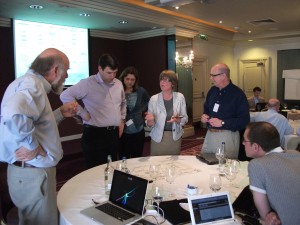RIM CERIF workshop in Bristol

The Innovation Support Centre at UKOLN (together with the JISC RIM and RCSI Programmes) organised a workshop in Bristol on 27-28 June on Research Information Management (RIM) and CERIF. The aim was to bring together people working on the various elements of the UK RIM jigsaw to share experience and explore ways of working together more closely. There were around 30 participants over the two days, including JISC RIM and MRD projects and programme managers, support and evaluation projects, Research Councils, funders and repository infrastructure projects. It was great to have Brigitte Jörg there in the first week of her new role at the Innovation Support Centre as National Coordinator for the CERIF Support Project. JISC projects formed the core audience, with some other contributors coming and going according to demands back at the office. RIM-related developments certainly continue apace. Just published the previous week was the HE Data and Information Landscape report; Andy Youell (director of the project at HESA) highlighted the significance of getting decision makers right across the sector to work together for the first time eg there has been no HE body to lead on data standards, hence no coherence. There is a need to raise information and data issues out of the ‘nerd space’ (!) to senior management level.
Another signficant step forward announced was a test verion of a ‘CERIFy’d’ Research Outputs System (ROS) which had just been made available on the first morning of the workshop. A demo can be viewed showing CERIF import. Live use is planned within several weeks. With NERC taking the decision to move to ROS, there will shortly be five Research Councils using the system. Interestingly, ROS plans to harvest from institutional repositories, which will avoid PIs having to submit individual outputs. ROS staff are working closely with the JISC CERIF in Action project and there are also close parallels with the IRIOS2 project.
The CERIF-based Gateway to Research (GtR) was another focus of discussion. Whereas ROS will be used for institutional input, GtR will be for access. Since data will be sourced from six different Research Council systems with no common ontology, a data dictionary will need to be developed. The project has been advised (by Jimmy Wales of Wikipedia) to concentrate on making the data available in a standard format (CERIF) and not to worry about the interface – instead prize challenges will be offered to communities for developing applications.
As might be expected the issue of identifiers arose a number times, researcher identifiers in particular, with ORCID being recommended by the JISC Task and Finish Group. HESA also highlighted the ‘big opportunities’ for person identifiers. The prospect of a ‘UK ORCID’ was discussed, alongside the business case and data security issues. JISC will be looking at organisational identifiers next, agreed as a much more difficult nut to crack.
Repository infrastructure development work was presented by the RepNet project at EDINA (aiming to increase the cost effectiveness of open access repositories) and RIOXX (metadata guidelines for repository managers specifically).
A range of breakout groups covered topics including impact, vocabularies/ontologies, institutional repository/CRIS challenges, research data, and options for maintaining CERIF outputs from JISC project (eg role of euroCRIS and CERIF task group). The REF breakout discussion resulted in agreement with HEFCE to develop a CERIF XML template for research groups, staff and outputs submission and to initiate a test pilot for submission (with KCL and the University of Bath – both to be approached). A test pilot will allow valuable learning within a proper framework – import/export of CERIF XML is planned to start in September 2012.
Presentations from the workshop and breakout outputs are available via the programme page. A fuller event report will be published in the next issue of Ariadne.




